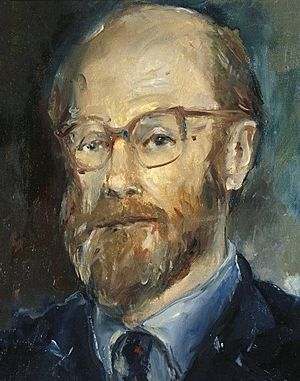Patrick D. Wall (scientist) facts for kids
Quick facts for kids
Pat Wall
|
|
|---|---|

Portrait painting of Patrick David Wall
|
|
| Born |
Patrick David Wall
25 April 1925 Nottingham, Nottinghamshire, England
|
| Died | 8 August 2001 (aged 76) |
| Nationality | British |
| Education | St Paul's School, London |
| Alma mater | University of Oxford |
| Known for | Gate control theory of pain |
| Awards | Royal Medal (1999) |
| Scientific career | |
| Fields | Neuroscience |
| Institutions | Yale School of Medicine University of Chicago Hebrew University of Jerusalem Harvard University Massachusetts Institute of Technology University College London |
| Doctoral students | Maria Fitzgerald |
Patrick David Wall (born April 25, 1925 – died August 8, 2001) was a British scientist who studied the brain and nervous system. He was known as a top expert on pain. He is most famous for his idea called the gate control theory of pain.
Contents
Early Life and Education
Patrick Wall was born in Nottingham, England, on April 25, 1925. His father, Thomas Wall, was a director of education. Patrick went to St Paul's School, London and then studied medicine at the University of Oxford. While at Oxford, he became very interested in how pain works.
He was very smart and published his first two science papers when he was just 21 years old. These papers appeared in important science magazines like Brain and Nature. While at Oxford, he also helped start the British Medical Students' Journal. This journal helped support the idea of creating the National Health Service (NHS), which provides healthcare for everyone in the UK. He finished his studies in 1948, having already published three papers in major science journals.
Career and Research
After college, Patrick Wall briefly helped people who had been affected by the Holocaust in Europe. Then, he moved to the United States. He started working at the Yale School of Medicine. There, he looked into new ways to help people with depression.
He later became a professor at other well-known universities. These included the University of Chicago, Harvard University, and the Massachusetts Institute of Technology (MIT). At MIT, he met Ronald Melzack, who became a close friend and research partner.
The Gate Control Theory
In 1962, Wall and Melzack wrote a paper about their new idea called the Gate control theory of pain. At first, not many people read it. But after they made it better and published it again in 1965, it got a lot of attention. Many scientists had questions about their new theory.
However, the theory gained more support when Wall worked with Bill Sweet to create the Transcutaneous Electrical Nerve Stimulator. This device, also known as TENS, helps control pain using small electrical pulses. The fact that TENS worked well helped prove that Wall and Melzack's theory was correct. This made Patrick Wall a very respected expert in neuroscience.
In 1973, he helped start the International Association for the Study of Pain. He also became the first editor of its medical journal, Pain.
Return to the UK
In 1967, Patrick Wall moved back to Britain. He became a Professor of Anatomy at University College London (UCL). At UCL, he was sometimes called "Mr Pat." Because of his great reputation, many students and researchers wanted to work in his labs. His lectures were also very popular.
Later, he also spent several months a year teaching at the Hebrew University of Jerusalem in Israel.
In 1982, he wrote The Challenge of Pain with Ronald Melzack. A year later, they wrote The Textbook of Pain, which is still used by many today. Patrick Wall received many honors for his work. He was elected a Fellow of the Royal Society of Physicians in 1984. In 1989, he became a Fellow of the Royal Society, which is a very high honor for scientists. He was even considered for a Nobel Prize many times. In 1999, he received the Royal Medal. This award recognized his important discoveries about how our bodies feel and process pain.
Personal Life
Patrick Wall was married three times. He enjoyed watching birds in his free time. He also had strong beliefs about society and worked to support various causes he cared about.
In 1996, he was diagnosed with prostate cancer. He bravely fought the illness and continued his research. He even published a book called Pain: The Science of Suffering while he was sick. Patrick Wall passed away on August 8, 2001, at the age of 76.

